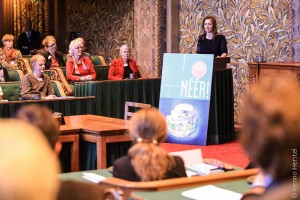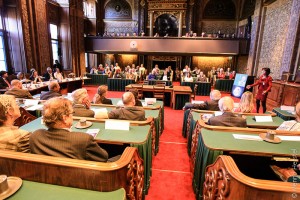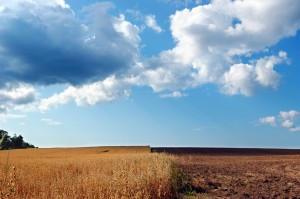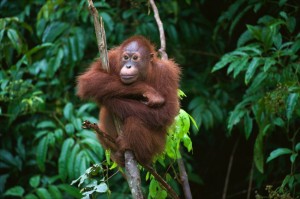Worldlog week 23 – 2013
Letzte Woche habe ich meine neue Sammlung wissenschaftlicher Artikel mit dem Titel „Méér!“ (Mehr!) dem Parlament präsentiert. Wissenschaftler, die Beiträge für diese Sammlung lieferten, haben eine Reihe Analysen abgegeben die sich dafür einsetzen, dass wir die Grenzen unserer Erde als Ausgangspunkt für unser Handeln wählen. Mehr! ist ein Leitfaden für Politiker, Entscheidungsträger und Bürger, der eine radikale Umkehr zu mehr ökologisch nachhaltigen Entscheidungen ermöglichen soll.
In Mehr! versammle ich wissenschaftliche Einsichten, welche die momentane Krise aufzeichnen und Lösungsvorschläge aufzeigen. Die Beiträge kommen von unabhängigen Wissenschaftlern, die sich über die Zukunft von Mensch, Tier und Umwelt sorgen machen und aus verschiedensten Blickwinkeln praktische Problemlösungen für die Krise anreichen.
Dies sind die Informationen auf dem Klappentext:
Mehr! ist das zentrale Thema unserer Gesellschaft geworden: Mehr von allem und mehr als da ist. In den vergangenen Jahrzehnten, mit noch nie da gewesenem Wohlstand, hat sich der Glaube verfestigt, dass Wirtschaftswachstum nicht nur grenzenlos, sondern auch eine Vorraussetzung für Glück und Wohlstand ist. Wo Wirtschaft einmal die Wissenschaft von der Produktion und Verteilung unserer knappen Mittel und Ressourcen war, liegt der Fokus mittlerweile fast ausschliesslich auf Geld- und Währungsfragen. Die Systemkrise, die sich 2008 als Krise der Banken darstellte, erweist sich jetzt als Währungskrise. Und klar ist auch, dass ausserdem die Artenvielfaltskrise, der Klimawandel, die Welternährungskrise und etliche andere Probleme unseren Wohlstand bis in den Kern bedrohen.
Wir haben uns diese Woche für nachhaltige Landwirtschaft eingesetzt. Denn nachhaltige Landwirtschaft darf nicht unter den neuen Regelungen der Europäischen Union, zum Zulassungsprozess für neue Pflanzensorten, zu leiden haben. Zum Glück unterstütze die zweite Kammer des Parlaments unseren Antrag einstimmig.
Die Europäische Kommission hat vorgeschlagen, dass die Vorschriften für Produktion und Handel von Saatgut verändert werden sollen. Es sollen strenge Anforderungen für das Saatgut, das in der Landwirtschaft verwendet werden darf, gestellt werden. Alle Pflanzensorten müssen laut diesem Vorschlag registriert werden, und diese Registrierung kostet eine Menge Geld. Der Europäische Vorschlag hat für viel Unruhe bei städtischen Landwirten, Gemüsegärtnern Saatgutzüchtern und Bio-Bauern gesorgt. Sie befürchten, dass sie nur noch registriertes Saatgut benutzen dürfen und der Tausch von Saatgut nicht mehr erlaubt sein würde.
Aus dem endgültigen Vorschlag ist zu entnehmen, dass diese Vorschriften nicht für Privatpersonen gelten würden. Auch kleinere Saatgutzüchter und traditionelle Saatgutrassen müssten sich nicht an die Registrierungspficht halten. Trotzdem sind wir der Meinung, dass die vorgeschlagenen Registrierungvorschriften zu streng sind, und dass sie für den Biolandbau hinderlich sein könnten.
Darum haben wir einen Antrag eingereicht, in dem wir die Regierung dazu auffordern sich, in den Verhandlungen zu dem Vorschlag der Europäischen Kommission, für die Interessen der kleinen Saatgutzüchter und Biobauern einzusetzen und diese zu schützen.
Schlechte Nachrichten für den brasilianischen Urwald. Ein Forschungsergebnis macht deutlich, dass die Urwaldabholzung in Brasilien zu kleineren Baumsamen führt.
Unterschreiben Sie hier damit 1,2 Millionen Hektar Lebensraum des Orang Utans auf Sumatra gerettet werden können. Dieses Gebiet wird unmittelbar von der Palmölindustrie bedroht.
Bis nächste Woche! Marianne
Last week, I presented my new scientific volume titled More! to the Upper House. Scientists who contributed to the new volume, presented a range of analyses which urge us to base our acts on the borders of the earth. More! is a guideline for politicians, policymakers and civilians to make a radical change to other and sustainable policy choices.
In More! I have compiled scientific insights which analyse the current crises and help solve them in conjunction with each other. The contributions come from independent scientists who are concerned with the future of humans, animals, nature and the environment, and advocate practicable solutions for the crises from various angles.
This is the information on the back cover:
More! has become the key theme of our community: more of everything and more of what is available. During the past decade of unprecedented wealth, we started to believe that the growth of our economy is not only unlimited, but also a condition for happiness and wealth. Where economy was first the science of production and distribution of scarce goods and means, it is now almost exclusively about money and monetary issues. The system crisis that first presented itself in 2008 as a banking crisis, is now manifesting itself as a monetary crisis. And additionally, there clearly is a biodiversity crisis, a climate crisis, a world food crisis and other scarcity issues, which seriously threaten our welfare and wealth.
We made an effort for sustainable agriculture this week. Because sustainable agriculture should not be hindered by new regulations on the registration of plant varieties, set by the European Union. Fortunately, the Upper House unanimously seconded the motion!
The European Commission made a proposal to amend legislation on the production and marketing of seeds. It contains strict rules on seeds that are permitted to be used in agriculture. In accordance with the proposal all plant varieties must be registered, but registrations are expensive. The European proposal has caused a great deal of unrest among city farmers, vegetable gardeners, and among organic farmers and breeders. They feared that they would be permitted to only use registered seeds, and that the exchange of seeds would be disallowed.
The definitive proposal showed that the new legislation does not apply to private persons. Small seed breeders and traditional seed varieties would not have to comply with any new registration rules. We believe that the registration rules in the proposal are too strict, and could be an obstruction for organic farmers.
That is why the Party for the Animals called for a motion, requesting the government to prioritize the interests of small breeders and organic farmers in the negotiations about the European Commission’s proposal, and to protect their interests.
Bad news for the rainforest in Brazil. Research suggests that rainforest deforestation in Brazil leads to seed shrinkage.
Sign here to save 1.2 million acres of habitat of the orangutans on Sumatra. This area is endangered by the palm oil industry.
Until next week! Marianne



